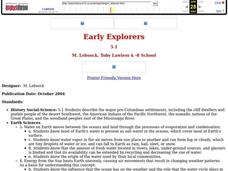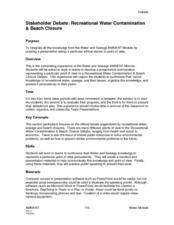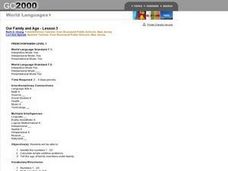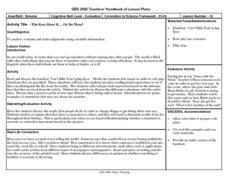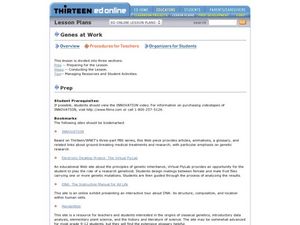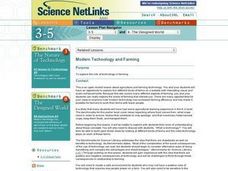Curated OER
Early Explorers
Fifth graders study early explorers. For this World history lesson, 5th graders draw an outline of a map labeling each part, build geographical features out of dough, and paint each of the land and water features.
Curated OER
Lights, Camera, Action!
Students develop a communication project about city wildlife. In this wildlife service project lesson, students research city wildlife, create a presentation of their groups choice, and present their findings. Students evaluate how their...
Curated OER
Genetically Modified Food
Students work in teams to develop a presentation and handout representing a particular point of view in a genetically modified food debate. They synthesize their knowledge of food, food contamination, nutrition, and their issues, and...
Curated OER
Recreational Water Contamination and Beach Closurew
Students work in teams to develop a presentation and handout representing a particular point of view in a recreational Water Contaminationand Beach Closure Debate. They synthesize their knowledge of recreational water, sewage, and their...
Curated OER
Clifford Learns About the Circus and So Do We!
Students investigate the characteristics of different circus jobs and the animals commonly seen at the circus. They read a book about clowns and construct and perform a trick hot dog. Students also create a clown accordion book.
Curated OER
Understanding My Pyramid
Students investigate the food pyramid. In this nutrition activity, students view and discuss the food pyramid and the role it plays in our diets. Students develop a three dimensional model of the food pyramid and create a nutritious meal...
Curated OER
Our Family and Age
Start by playing a song about numbers. "Sing, Dance, Laugh, and Eat Quiche" is suggested. Then, start counting things around the room. Introduce yourself, and have kids start to introduce themselves when they catch on to the vocabulary....
Curated OER
Where In the World Are the Resources?
Students use the internet to research the amount of natural resources in a specific area on Earth. In groups, they locate the supply of each natural resource on a map in that area and what can be done to reduce their usage. They also...
Curated OER
The Eyes Have It ... Or Do They?
Students explore facial expressions for the hidden meanings being communicated. Truth can be hidden or at least disguised by a particular expression. The reality of control and the manipulation of truth is discussed in this lesson plan.
Lee & Low Books
Classroom Guide for Sacred Mountain: Everest
The most famous climbers of Mount Everest could never have made it to the summit without the assistance of the local Sherpa. Christine Taylor-Butler's nonfiction children's book Sacred Mountain: Everest is the focus of an extensive...
Curated OER
Exploring Islamic Lands
Students examine the lives of Islamic teens. In this global studies lesson, students explore selected Internet sites to discover the attributes of Islam, the cultural traditions of Islam, and information regarding Middle Eastern...
Curated OER
America's Heartland
Fifth graders investigate imports and exports to discover its importance to America as a world power. In this Imports and exports lesson, 5th graders discuss how climate and natural resources aid a country in becoming a world power....
Curated OER
Aristotle
In this online interactive philosophy worksheet, students respond to 10 short answer and essay questions about Aristotle. Students may check some of their answers on the interactive worksheet.
Curated OER
Bison on the Plains
Fifth graders explore U.S. geography by reading assigned text about American Indians. For this migration lesson, 5th graders identify the differences between Native Americans and European settlers who traveled through middle America in...
Curated OER
Sharks At Risk Viewing Guide
Students complete a worksheet while viewing a film about sharks. They examine the reasons for overfishing of the oceans. They identify predator-prey relationships as well.
Curated OER
Genes at Work
Students explore and discuss genetics stories and answer questions about genetic outcomes of offspring. In this genetics lesson, students read genetics stories on a web site. Students use a chart to answer questions regarding the...
Curated OER
The West the Railroads made
Learners investigate the effects of time and distance for the creation of a successful railroad. In this railroad lesson, students recognize the railroad's need for an exact time schedule was the cause for the creation of time zones. ...
Curated OER
Modern Technology and Farming
Students explore agriculture by conducting a technology conversation in class. In this food system lesson, students identify the path of food from farm to plate and view a virtual farm on the Internet. Students complete a farming...
Curated OER
A Wild Chain Reaction
Students explore habitats. In this habitat lesson, students break into groups and are labeled as a part of a habitat. Students then do an activity with yarn that shows how all of the parts are connected and depend on each other....
Curated OER
Race and Genetics: An Integrated Approach
Students analyze racial issues related to the Human Genome Project. They participate in a mock symposium and write a reflection/position paper based on specific ethical principals.
Curated OER
Stem Cell Research
Young scholars examine embryonic cell research and the controversy that surrounds it. In this stem cell lesson students use a debate model and present and defend their positions.
Curated OER
The Buzz on Bees-How Bees Make Our World a Little Sweeter
These lessons can help students learn about the important role bees play in the ecosystem.
Curated OER
The Four Seasons
Students examine four paintings by Robert Harris and identify the season portrayed. Using the characteristics for each season, they write a poem and create a drawing of their own. In groups, they describe the different types of...
Curated OER
The Importance of Plants to Native Cultures in the Past and Present
Eighth graders investigate the founding and history of Sluice Boxes State Park. They use both primary and secondary resources to collect data. The focus is upon the use of native plants to make medicines. They write reports about several...


